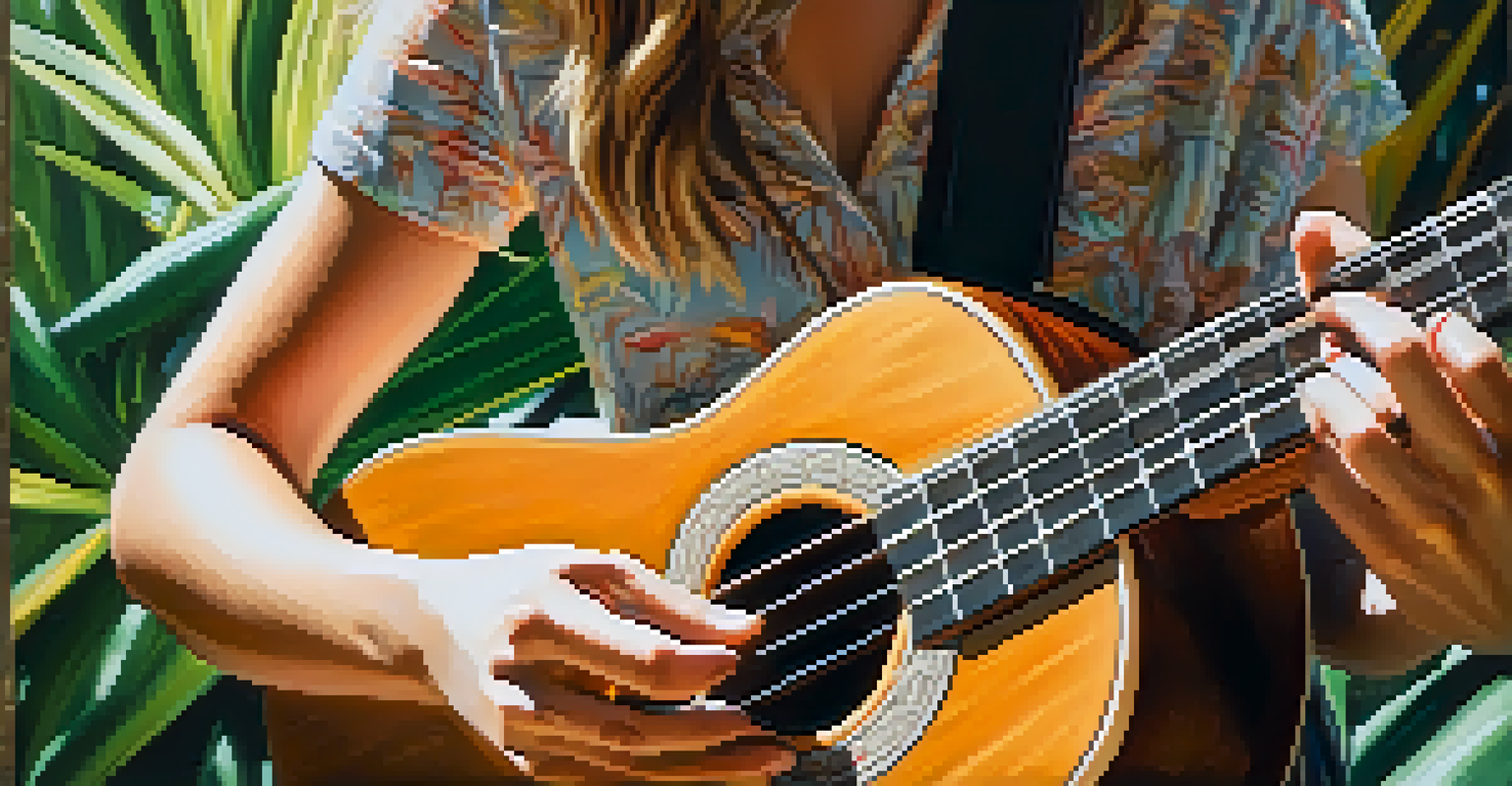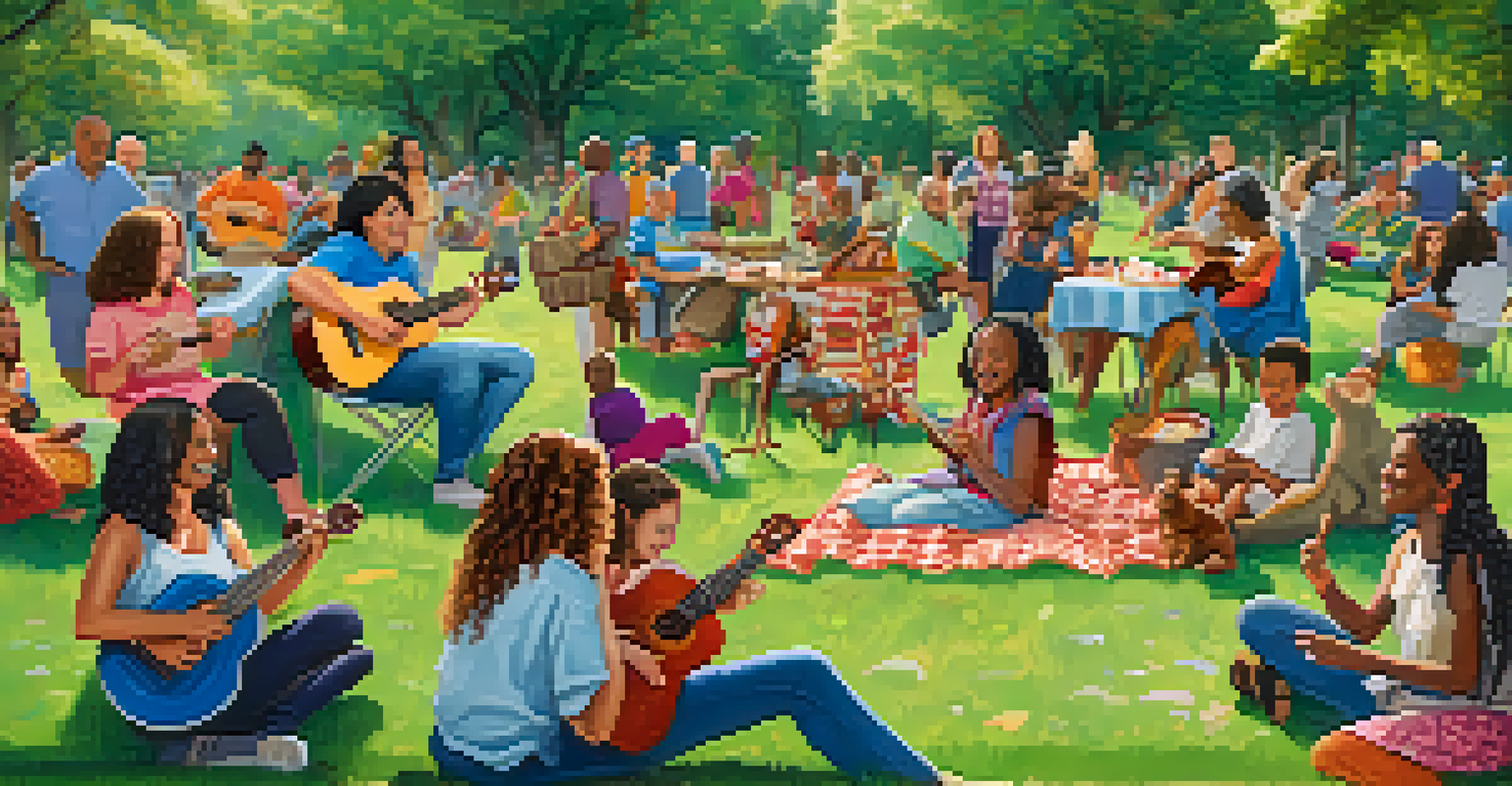From Hawaii to the World: The Ukulele's Cultural Journey

The Origins of the Ukulele in Hawaii
The ukulele, often associated with the vibrant culture of Hawaii, has its roots in the 19th century. It was developed from Portuguese string instruments brought over by immigrants, particularly the machete. The cheerful sound of the ukulele quickly resonated with the people of Hawaii, becoming a staple in their music and gatherings.
The ukulele is the only instrument that I know of that people can play who have never played music before. It’s so easy to pick up and start playing a tune.
Local musicians embraced the ukulele, infusing it with their unique sounds and rhythms. This instrument became a symbol of Hawaiian identity, capturing the essence of island life and spirit. With its small size and light weight, it was easy to carry along to luaus and beach parties, making it an instant favorite.
As the ukulele grew in popularity, it began to blend with other musical styles, paving the way for its evolution. Hawaiian music, with its rich storytelling tradition, found a perfect partner in the ukulele's melodic tones. This harmonious relationship set the stage for the instrument's journey beyond the shores of Hawaii.
The Ukulele's Adoption Beyond Hawaii
By the early 20th century, the ukulele began to gain traction outside of Hawaii, particularly in mainland America. Its catchy sound and accessible playability made it a hit among musicians and amateurs alike. This newfound popularity was further boosted by the Hawaiian music craze of the 1910s and 1920s.

Traveling performers showcased the ukulele across the continental U.S., introducing audiences to its charm. The instrument found its way into jazz bands and vaudeville acts, making it a versatile addition to various musical genres. This cross-pollination of styles led to a surge in its demand and use.
Ukulele's Hawaiian Roots
The ukulele originated in Hawaii in the 19th century, evolving from Portuguese string instruments and becoming integral to Hawaiian culture.
As the ukulele continued to spread, it sparked interest in Hawaiian culture, leading people to explore its traditions and music more deeply. The instrument became a bridge connecting diverse communities, all captivated by its joyful sound and simple chords. This cultural exchange laid the groundwork for the ukulele's global presence.
The Rise of the Ukulele in Popular Music
In the latter half of the 20th century, the ukulele found its way into popular music, further solidifying its place in the music world. Iconic artists like Tiny Tim brought the ukulele into the mainstream, showcasing its unique sound on television and in concerts. His rendition of 'Tiptoe Through the Tulips' introduced the instrument to a new generation.
Music can change the world because it can change people.
As the music scene evolved, so did the ukulele's presence in various genres. From folk to pop, artists began incorporating the ukulele into their songs, drawn by its light-hearted and cheerful essence. This versatility allowed the instrument to thrive, appealing to both seasoned musicians and novice players.
With the rise of social media platforms, the ukulele experienced a resurgence in popularity in the 21st century. Viral videos and tutorials made it easier for people to learn the instrument, creating a global community of ukulele enthusiasts. This newfound accessibility opened doors for creativity and collaboration among musicians worldwide.
The Cultural Significance of the Ukulele
The ukulele is more than just an instrument; it is a cultural symbol that represents the spirit of aloha. It embodies the values of community, joy, and connection, resonating with people from all walks of life. The simple act of playing the ukulele can bring people together, fostering friendships and shared experiences.
In Hawaii, the ukulele is often associated with celebrations, luaus, and family gatherings. It serves as a reminder of the rich cultural heritage of the islands and the importance of music in Hawaiian life. The instrument's cheerful sound reflects the islanders' love for life and their connection to nature.
Global Popularity Surge
By the early 20th century, the ukulele gained widespread popularity in mainland America, showcasing its versatility across various musical genres.
Globally, the ukulele has become a symbol of cultural exchange, bridging gaps between diverse communities. Whether played in a small living room or on a grand stage, the ukulele fosters unity and understanding through music. This cultural significance continues to inspire new generations of players and listeners alike.
Notable Ukulele Players Through the Years
Throughout its history, the ukulele has been championed by numerous talented musicians who have shaped its legacy. Artists like Israel Kamakawiwo'ole captivated audiences with their soulful performances, blending traditional Hawaiian music with contemporary styles. His rendition of 'Somewhere Over the Rainbow' remains iconic, showcasing the ukulele's emotive power.
Another remarkable player is Jake Shimabukuro, known for his virtuosic playing and innovative techniques. He has taken the ukulele to new heights, pushing the boundaries of what the instrument can achieve. His covers of popular songs have garnered millions of views, inspiring countless fans to pick up the ukulele themselves.
These musicians, along with many others, have played a pivotal role in elevating the ukulele's status on the global stage. They demonstrate the instrument's versatility and its ability to convey a range of emotions, from joy to nostalgia. Their contributions continue to influence aspiring ukulele players around the world.
The Ukulele's Role in Education and Therapy
The ukulele is not only a fun instrument to play, but it has also found its place in educational settings. Many schools have adopted the ukulele as a tool for teaching music, thanks to its simplicity and engaging nature. Its four strings make it easier for beginners, allowing students to learn the fundamentals of music quickly.
Beyond education, the ukulele has therapeutic qualities that benefit individuals of all ages. Music therapy programs incorporate the ukulele to promote emotional expression, improve cognitive function, and foster social connections. The act of playing can be incredibly soothing, offering a creative outlet for those facing challenges.
Cultural Symbol of Connection
Beyond music, the ukulele embodies the spirit of aloha, fostering community and connection through its joyful sound and simple playability.
As more educators and therapists recognize the ukulele's benefits, it continues to gain traction in various settings. Workshops and community programs introduce the instrument to people from different backgrounds, fostering inclusivity and creativity. The ukulele's role in education and therapy showcases its power to enrich lives and build connections.
The Future of the Ukulele in Global Music
As we look ahead, the ukulele's future in global music appears bright and promising. Its unique sound continues to inspire musicians across genres, from indie folk to pop and beyond. With the rise of digital platforms, artists can easily share their ukulele-driven creations with a worldwide audience, fostering new collaborations.
Moreover, the instrument is evolving as musicians experiment with different techniques and styles. Hybrid genres are emerging, blending the ukulele with influences from various cultures, creating fresh and exciting sounds. This innovation keeps the ukulele relevant and adaptable in an ever-changing music landscape.

As more people discover the joys of playing the ukulele, its community continues to grow. Festivals, online forums, and social media groups connect enthusiasts, providing a space for sharing experiences and learning from one another. The ukulele's journey is far from over, and its impact on music and culture is sure to resonate for years to come.